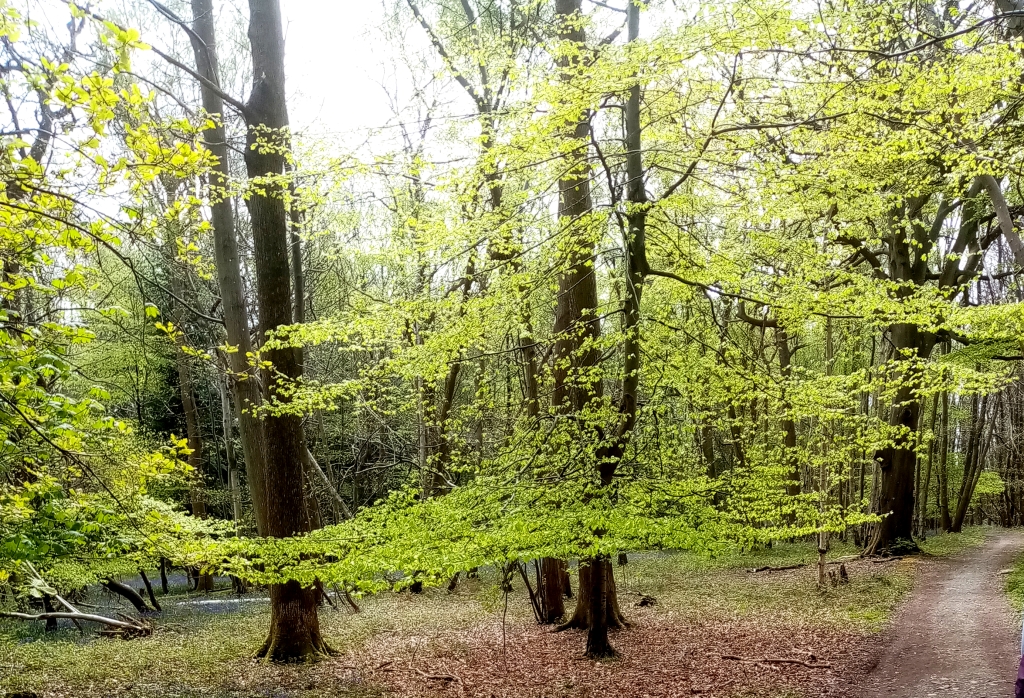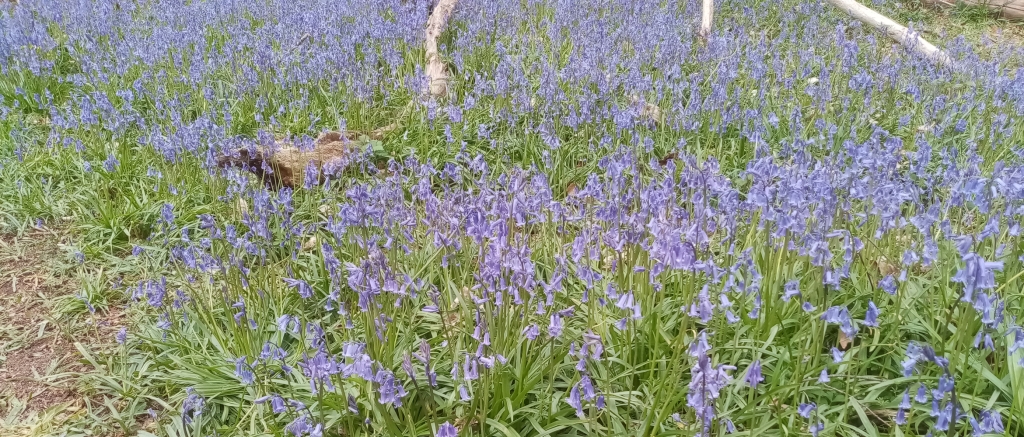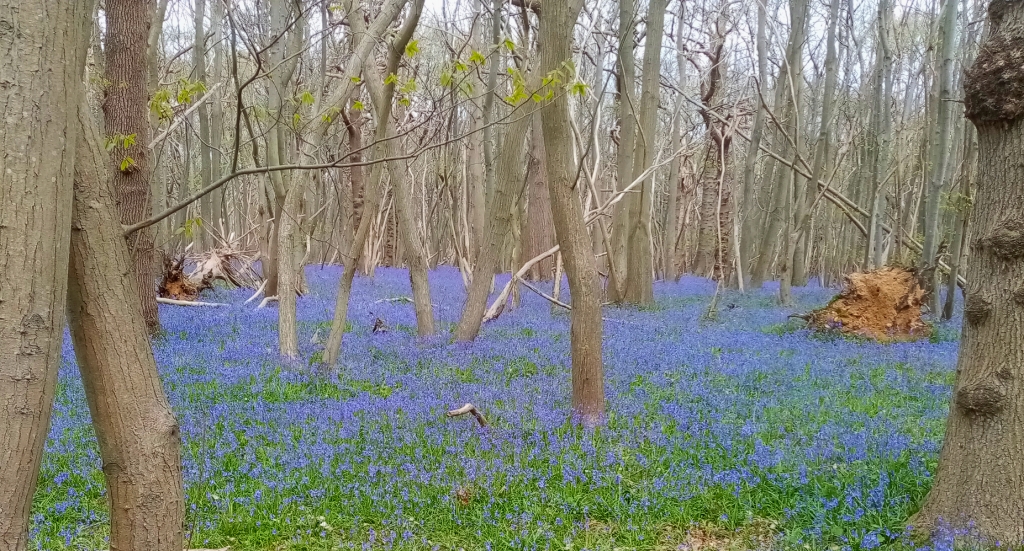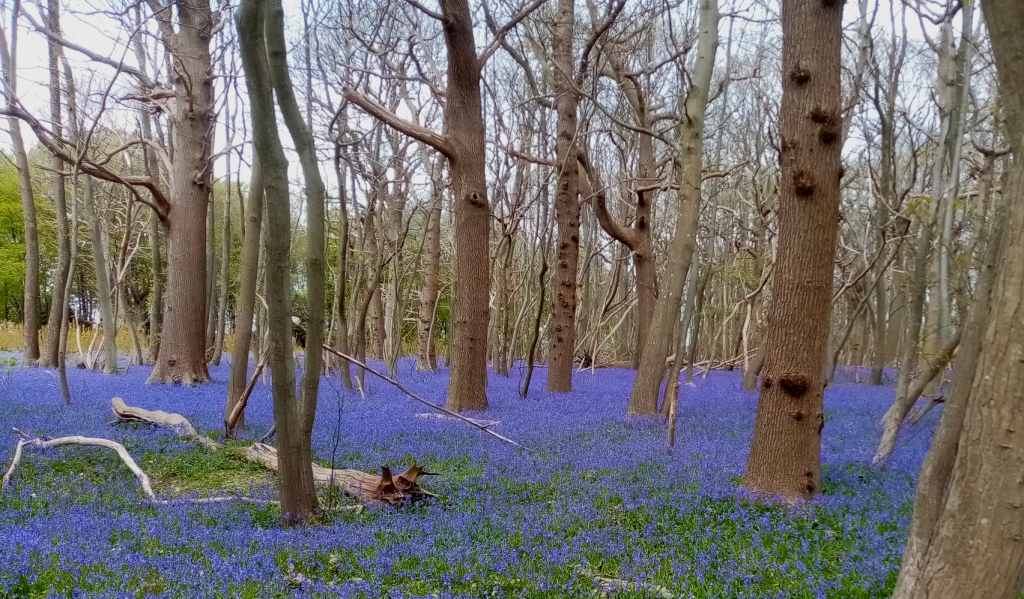



Our Sunday walk took us through King’s Wood near Chilham. A graceful beech sapling, and bluebells, the more fragrant after a night’s rain.


An Estonian friend’s news from home: Tallinn is unnaturally quiet, few people on the streets, but the forests and beaches are full of people enjoying unexpectedly not being in town. Let’s hope and pray they stay safe.
No sooner had I written that paragraph than I read that in France, the Prefects of Departements around the coast are closing all the beaches to the public.

I don’t think the ancient Israelites were altogether fond of the forest. One of the most vivid forest stories tells how Absalom, King David’s rebel son, was caught by the hair as he rode under an oak tree while his mule galloped on without him. Absalom was a sitting duck for Joab and his men, who killed him, bringing David to tears. (2 Samuel 18, 19). Earlier, in Joshua 17, we read how the tribe of Joseph cleared away the forest to have room to settle and farm, a process that continues around the world to this day.
But, even setting aside the effect on the climate, something is lost as we clear the forest and then build suburbs over the resulting fields. Closeness to creation and the creator. Abel, at 3¾ years has found it at Forest School: he spends a day a week in the woods with his nursery school, getting muddy and enjoying himself among the trees. We would wait forever for him to tell us what he gets up to, but my teachers’ magazine ‘Educate’ tells how children are equal partners in learning and can take over the leadership of such sessions, under the guidance of their teachers.
One teacher, Jen Hawkes, says, ‘It’s about shared experiences and making friendships. They build a bond in the forest that helps them in the classroom. We’ve had lots of children making friendships who have previously struggled with that – which is so important, especially for mental health.’ So what the children do is by no means all that they learn out of doors. They learn to trust each other.

Perhaps the priests who ran my school were prophetic in sending us boys into the woods on half-holidays. There would be one or two at least in July; the priest-teachers were probably as sick of lessons as we were, and whatever we may have fancied they were up to in our absence, they no doubt had meetings to discuss our progress and all the routine matters that arise in any school. But we were free for the day. Note the seven pound jam tins, blackened from being used to cook a shared meal on the open fire to the left. Glamping this was not!
Fifty-odd years after this photograph captured the moment, I am in touch with three of the lads shown, as well as others not here present. That says something for the bonds built in the forest and other parts of our shared life. Perhaps the fathers were prophetic!
MMB

We are always talking about looking and seeing, here at Will Turnstone. When we took Abel out to the woods yesterday we found this invitation to look at Betula, the Lady of the Woods. Isn’t she lovely? Find one of her sisters near you and enjoy the sight.
Here is something I’ve been saving till the right picture turned up. This one is good enough to accompany this passage from Nan Shepherd’s ‘The Living Mountain’. A writer may reveal what the reader more than half knows, awakening joyful recognition in her audience. I was reading to learn about the Scottish Highlands, but I discovered something all-but known about the birch I see as I open the curtains or come home: the birch. Here is Shepherd on p53:
Birch … that grows on the lower mountain slopes, needs rain to release its odour. It is a scent with body to it, fruity like old brandy, and on a wet warm day, one can be as good as drunk with it. Acting through the sensory nerves, it confuses the higher centres; one is excited, with no cause that the wit can define.
It’s always good to return home even from a quick walk to the shops. There is magic in fingering the keys as I approach under the lime trees – trees that may not flourish on Cairngorm but here share their bee-sung, scented glory every summer. Birch is wind-pollinated, needing no nectar, but its fresh-air scent, which I barely register even in wet weather, is part of coming home. I never realised till Nan Shepherd told me! And the blackbirds sing louder in the rain.
We occasionally berate the birch for its scattered seedlings, which occupy any bare earth and even take root in garden walls. As Rome fell away from Britain no-one removed the young trees, and the towns crumbled.
Not far from here at the derelict mine, a birch forest has sprung up on the spoil. Silver birch, I called it as a child – but it is pure gold in Autumn.
Do seek out Nan Shepherd’s book and see, hear, smell, feel with her.